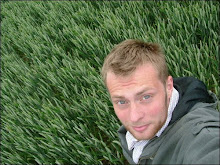We got started in February with an ABCTales/AbracaDABra Radio award for my children’s story Shark with the Mind of a Rabbit. The story had a dual origin in reading sessions with Volunteer Reading Help and old university jokes about a lecturer who we had cast as a wicked witch...
Then came the interviews – and our first celebrity interviewee was a Teletubby, no less...Nikky Smedley joined me to discuss her storytelling and dance production The Tell Woman in March.
April saw the Annual General Meeting of the British branch of IBBY, where I met Mick Inkpen of Kipper fame. During my time with Volunteer Reading Help, I saw a child go from tearing books up on sight to vowing to write his own...Mick’s Anything Cuddly Will Do was a key book in making that transition.
In May I wrote my first theatre review for Claire Massey’s great blog, The Fairy Tale Cupboard. Claire, who edits New Fairy Tales, also pointed me to one of my favourite events of the year, Ignite 2010.
July was the highlight of the literacy calendar for me - I was privileged to speak at the House of Commons on behalf of Volunteer Reading Help, the incredible English charity which helps children develop a lifelong love of reading.
In the same month, I read the first of the late Patricia Wrightson’s Wirrun books, which led on to an interview with Patricia’s publisher Mark Macleod and a series of features on these important, controversial and underrated pieces of fantasy writing. Huge thanks to Judith Ridge for putting me on to this great writer.
The Song of Wirrun, and Nnedi Okorafor’s pitch-perfect novel Zahrah the Windseeker, were my favourite reads of the year. (To be honest, I’m almost scared to read anything else by Nnedi because that first book was so perfect!).
The latter part of the year saw Books and Adventures go on a ‘world tour of literacy support’ with NGOs and charities from San Francisco to Sydney and beyond. Starting with Reading Partners and Reach Out and Read in the USA, we moved on to South Africa’s help2read, and then Rhonda Brain’s inspirational Paint the Town Read scheme in Australia.
In November, I was foolhardy enough to participate in, and complete, the 50,000-word challenge of NaNoWriMo, although the resulting text (written to a topic determined at random by fellow writers) will now be broken up to be re-used in an entirely different way!
Still, Chris Angotti, who runs the Young Writers’ Program for Nano, was kind enough to grant an interview during his busiest month of the year –you can find what he had to say about enthusing and supporting young writers here.
 |
| Roland Pietsch |
Other highlights from the year’s interviews included: Stories from the Web, Edgardo Zaghini of Outside In, storyteller and psychologist Steve Killick, philanthropy guru Mike Dickson, Elena Schmitz of Wales' Young People's Writing Squads, and an old colleague turned pirate historian, Roland Pietsch. Some of these went on to provide useful fodder for Zoe Toft’s directory of book charities at Playing By the Book.
Amid all this frantic reading, writing and blogging, there was a little time for some running, too. Getting bitten by that bug has led me to make some dumb commitments, like signing up to run a 10k in the immediate aftermath of Christmas. (Assuming we don’t get snowed off, I’ll be the guy at the back of the field, with turkey and sprouts visibly bouncing up and down in a still-swollen belly!).
Once post-Christmas recovery has completed, there’ll be a lot more Books and Adventures to come in 2011...I’m looking forward to more interviews from around the world, including YA author Claire Dopson, and guest bloggers including storyteller Eric Maddern. There’s also some big travel plans on the horizon, so hopefully I’ll be delivering some front-line reports from foreign climes along the way!
Wishing you all the best for the season...see you in 2011!
Matt
PS...How pleased was I to see flying sharks in Doctor Who???





